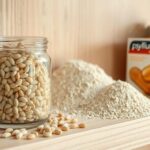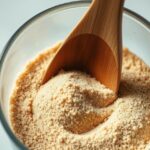Psyllium Husk for Dogs: Benefits and Uses
As a dog owner, you’re likely always on the lookout for ways to support your furry companion’s overall health and wellness. One natural ingredient that has gained popularity in recent years is psyllium husk for dogs, a type of dietary soluble fiber.

Psyllium husk works by absorbing water in the gut, forming a gel-like substance that helps the body absorb nutrients more efficiently. By understanding its benefits, you can make informed decisions about incorporating it into your dog’s routine.
Key Takeaways
- Does Psyllium Husk Go Bad?
- Supports canine digestive health
- Regulates bowel movements
- Promotes nutrient absorption
- Natural supplement for overall wellness
- Can help address common digestive issues
What Is Psyllium Husk?
Derived from the Plantago ovata plant, psyllium husk is a soluble fiber used to support digestive health in dogs. The Plantago ovata plant, primarily cultivated in India, produces thousands of tiny, gel-coated seeds. It’s the outer coating (husk) of these seeds that contains the beneficial soluble fiber.
Origin and Natural Properties
Psyllium husk is obtained from the outer husk of the Plantago ovata seeds. When it comes into contact with water, it forms a gel-like substance due to its high mucilage content. This property gives psyllium husk its unique benefits for digestive health. The natural supplement is rich in hemicellulose mucilage, which absorbs water and swells in the intestine, creating a gentle, bulk-forming effect.
- Psyllium husk is a natural, non-synthetic fiber supplement.
- The Plantago ovata plant has been used for centuries as a natural remedy.
- The soluble fiber in psyllium husk supports healthy digestion.
How Psyllium Husk Works in the Digestive System
Psyllium husk passes through the digestive system without being fully broken down or absorbed, allowing it to regulate digestion throughout the entire digestive tract. As it moves through the tract, it absorbs water and swells, creating a gentle, bulk-forming effect that helps normalize bowel function. This natural process supports the overall health of the digestive system.
Psyllium Husk for Dogs: An Overview
As a natural and effective supplement, psyllium husk is becoming increasingly popular among dog owners seeking to improve their pets’ digestive health. Psyllium husk is a fiber supplement that can help support a dog’s overall gastrointestinal well-being.
Soluble vs. Insoluble Fiber
Understanding the difference between soluble and insoluble fiber is crucial when considering supplements for your dog’s digestive health. Soluble fiber, such as that found in psyllium husk, dissolves in water to form a gel-like substance that slows digestion and helps regulate nutrient absorption. In contrast, insoluble fiber adds bulk to the stool, aiding in the movement of food through the digestive system.
How Dogs Process Dietary Fiber
Dogs process dietary fiber differently than humans, with unique adaptations in their digestive tract. When dogs consume psyllium husk, the soluble fiber helps regulate the speed at which food moves through the digestive system, allowing for better nutrient absorption. The canine digestive tract responds to dietary fiber by producing beneficial short-chain fatty acids through fermentation, which nourishes the cells lining the colon.
| Fiber Type | Function | Benefits for Dogs |
|---|---|---|
| Soluble Fiber | Dissolves in water, forming a gel-like substance | Regulates nutrient absorption, supports healthy digestion |
| Insoluble Fiber | Adds bulk to the stool | Aids in the movement of food through the digestive system |
Key Benefits of Psyllium Husk for Canine Health
Dogs can experience a range of health benefits when psyllium husk is incorporated into their nutritional regimen. Psyllium husk is rich in fiber, which plays a crucial role in maintaining a healthy digestive system.
Improved Gastrointestinal Health
Psyllium husk supports gastrointestinal health by cleansing the colon and removing toxins and waste. This gentle cleansing action helps maintain the overall health of the digestive system.
Regulating Bowel Movements
The supplement regulates bowel movements, helping dogs with both constipation and diarrhea. By absorbing excess water and adding bulk to the stool, psyllium husk ensures regular bowel movements.
Weight Management Support
Psyllium husk aids in weight management by helping dogs feel fuller for longer. The fiber content reduces the likelihood of overeating, supporting a healthy weight.
How Psyllium Husk Manages Digestive Issues
Psyllium husk is a versatile supplement for dogs with digestive issues. It acts as a gentle, bulk-forming laxative, relieving constipation and treating diarrhea by absorbing excess water in the digestive tract and forming a gel-like substance that adds bulk to the stool.
Treating Diarrhea in Dogs
For dogs suffering from diarrhea, psyllium husk absorbs excess water in the intestines, forming a gel that helps solidify loose stools and reduce the frequency of bowel movements. This process helps to firm up the stool, making it easier to pass.
- Psyllium husk helps to solidify loose stools.
- It reduces the frequency of bowel movements.
- The gel-like substance formed by psyllium husk helps to firm up the stool.
Relieving Constipation
In cases of constipation, psyllium husk works by drawing water into the intestines, softening hard stools, and making them easier to pass. It also provides bulk that stimulates natural peristalsis.
- Psyllium husk softens hard stools.
- It stimulates natural peristalsis.
- The supplement provides bulk to the stool.
| Digestive Issue | How Psyllium Husk Helps |
|---|---|
| Diarrhea | Absorbs excess water, firms up stool |
| Constipation | Draws water into intestines, softens stool |

Psyllium husk is a natural and effective solution for managing digestive issues in dogs. Its gentle action makes it suitable for long-term use, and it works with the body’s natural processes to resolve digestive problems.
Psyllium Husk for Anal Gland Function
Psyllium husk plays a crucial role in maintaining anal gland function in dogs. Anal gland problems are a common issue in canines, causing discomfort and distress.
Understanding Anal Gland Problems
Anal gland issues occur when the small sacs located on either side of a dog’s anus become impacted, leading to inflammation and swelling. Symptoms include scooting, excessive licking of the anal area, and a distinctive fishy odor. These problems can be congenital or develop later in life.
- Anal gland impaction can cause significant discomfort and pain for dogs.
- High-fiber foods and supplements, such as psyllium husk, can help improve digestion and reduce inflammation in the large intestines.
How Fiber Supports Natural Expression
The fiber in psyllium husk adds bulk to the stool, creating natural pressure on the anal glands during defecation. This helps to express the glands regularly, reducing the risk of impaction.
- Psyllium husk helps create bulkier, firmer stools that put pressure on the anal glands, assisting with their regular expression.
- Regular use of psyllium husk can help prevent anal gland impactions and reduce the need for manual expression by veterinarians or groomers.
| Benefits of Psyllium Husk | Impact on Anal Gland Function |
|---|---|
| Adds bulk to stool | Creates natural pressure on anal glands during defecation |
| Improves digestion | Reduces inflammation in large intestines |
| Supports healthy gut microbiome | Assists with regular anal gland expression |
Scientific Evidence Behind Psyllium Husk Benefits
The effectiveness of psyllium husk in managing canine digestive issues is backed by a growing body of scientific research. Studies have demonstrated its efficacy in addressing various gastrointestinal problems, including chronic diarrhea and constipation.
Research on Chronic Large-Bthel Diarrhea
A notable study involving 22 police working dogs with chronic large-bowel diarrhea showed significant improvement when supplemented with psyllium husk at a dose of 4 tablespoons daily for one month. The response to the treatment was classified as “very good” in 50% of the dogs, “good” in 40%, and “poor” in 10%. During treatment, defecation frequency decreased from 3.5 to 2.9 times a day, and 90% of the dogs showed consistent and regular stools.
| Treatment Response | Percentage of Dogs |
|---|---|
| Very Good | 50% |
| Good | 40% |
| Poor | 10% |
Studies on Weight Management and Metabolism
Research has also documented the benefits of psyllium husk in weight management. Dogs in studies showed healthy weight gain when previously underweight due to digestive issues. The benefits of psyllium husk supplementation can extend beyond the treatment period, with many dogs maintaining improved digestive function even after supplementation ended.

The scientific evidence suggests that psyllium husk works by normalizing gut transit time, improving stool consistency, and supporting the growth of beneficial gut bacteria in dogs. By incorporating psyllium husk into their diet, dog owners can help promote their pets’ overall digestive health and well-being.
Proper Dosage Guidelines for Different Dog Sizes
The right amount of psyllium husk varies significantly based on your dog’s size and condition. Always consult with your veterinarian to determine the best dosage for your dog.
Small, Medium, and Large Breed Recommendations
For small dogs (under 20 pounds), a general recommendation is to start with 1/4 to 1/2 teaspoon of psyllium husk per meal. Medium-sized dogs (20-50 pounds) typically benefit from 1/2 to 1 teaspoon per meal, while large dogs (over 50 pounds) may require 1 to 2 teaspoons per meal.
| Dog Size | Weight Range | Recommended Dosage |
|---|---|---|
| Small | Under 20 pounds | 1/4 to 1/2 teaspoon per meal |
| Medium | 20-50 pounds | 1/2 to 1 teaspoon per meal |
| Large | Over 50 pounds | 1 to 2 teaspoons per meal |
Frequency and Administration Tips
Consistency is key when giving your dog psyllium husk. It should be administered at the same times each day, usually with meals, to establish a regular pattern of digestive support. Most veterinarians recommend dividing the daily dose between morning and evening meals. When introducing psyllium husk, start with about half the recommended dose and gradually increase over 7-10 days to allow your dog’s digestive system to adjust.
Ensure your dog has access to fresh water at all times to help the psyllium husk work effectively.
Safely Introducing Psyllium Husk to Your Dog’s Diet
A gradual introduction is key when incorporating psyllium husk into your dog’s diet to avoid digestive upset and allow their system to adjust to the increased fiber intake.
Starting with Small Amounts
Begin with approximately one-quarter of the recommended dose for your dog’s size, mixing it thoroughly with their regular food to ensure they consume it completely. This cautious approach helps prevent initial digestive discomfort.
- Start with a small amount to test your dog’s tolerance.
- Mix the psyllium husk well with their food.
- Gradually increase the dose over 7-10 days if no adverse effects are observed.
Monitoring Your Dog’s Response
Observe your dog closely for the first few days after introducing psyllium husk, watching for any signs of digestive discomfort such as excessive gas, bloating, or changes in stool consistency. If your dog tolerates the initial amount well, you can gradually increase the dose.
- Watch for signs of digestive discomfort.
- Adjust the dose based on your dog’s response.
- Ensure your dog always has access to plenty of fresh water.
It’s also crucial to consult with your veterinarian to determine the appropriate dose based on your dog’s current health status. Always ensure your dog has access to plenty of fresh

| Dog Size | Initial Dose | Gradual Increase |
|---|---|---|
| Small | 1/4 teaspoon | Every 2-3 days |
| Medium | 1/2 teaspoon | Every 2-3 days |
| Large | 3/4 teaspoon | Every 2-3 days |
The Importance of Hydration with Psyllium Husk
The importance of hydration cannot be overstated when it comes to psyllium husk supplementation in dogs. Psyllium husk absorbs significant amounts of water in the digestive tract, making adequate hydration crucial for its safe and effective use.
Why Water Intake Matters
Without sufficient water intake, psyllium husk can cause constipation or, in severe cases, lead to intestinal blockages that may require veterinary intervention. Ensuring your dog has access to fresh water at all times is vital, especially within an hour before and after consuming psyllium husk.
Ensuring Your Dog Stays Properly Hydrated
To ensure proper hydration, you can monitor your dog’s water intake and adjust as needed. For dogs that don’t drink enough water naturally, adding water to their food when mixing in the psyllium husk can help. Signs of inadequate hydration include straining during defecation, producing hard stools, or seeming uncomfortable after taking the supplement.
| Hydration Tips | Benefits |
|---|---|
| Ensure access to fresh water at all times | Prevents esophageal or intestinal obstruction |
| Monitor water intake | Helps prevent side effects from the supplement |
| Add water to food when mixing psyllium husk | Ensures proper hydration for dogs that don’t drink enough water |
Potential Side Effects and Precautions
When introducing psyllium husk into your dog’s diet, it’s crucial to be aware of the potential side effects. While generally considered safe, psyllium husk can cause adverse reactions if not administered properly.
Common Side Effects to Watch For
The most common side effects of psyllium husk in dogs include temporary gas, bloating, or mild changes in stool consistency. These issues typically resolve as the dog’s system adjusts to the increased fiber intake. However, more serious concerns can arise if psyllium husk is given without adequate water, potentially leading to esophageal or intestinal blockages that require immediate veterinary attention.
When to Consult Your Veterinarian
Dogs with certain pre-existing conditions, such as megacolon, intestinal narrowing, or difficulty swallowing, may not be good candidates for psyllium husk supplementation. If your dog experiences persistent diarrhea, vomiting, decreased appetite, or signs of abdominal pain after taking psyllium husk, discontinue use and consult your veterinarian immediately. It’s also essential to consult with your veterinarian before starting psyllium husk if your dog has any chronic health conditions or is taking medications, as fiber supplements can sometimes affect the absorption of certain drugs.
Psyllium Husk for Senior Dogs
Aging dogs experience various health issues, including digestive problems. As dogs age, their bodies undergo natural changes that can affect their overall health and digestive system. Senior dogs often face unique digestive challenges, such as decreased motility, changes in gut bacteria, and less efficient nutrient absorption.
Age-Related Digestive Challenges
Senior dogs are prone to various digestive issues, including constipation, which becomes more common due to reduced physical activity, medication side effects, and natural changes in digestive function. Psyllium husk can be particularly beneficial for senior dogs by providing gentle, non-irritating support for regular bowel movements without straining their aging digestive systems.
- Decreased motility and changes in gut bacteria can affect nutrient absorption.
- Constipation is more common in older dogs due to reduced physical activity and medication side effects.
- Psyllium husk supports regular bowel movements without straining the digestive system.
Special Considerations for Older Dogs
The weight management benefits of psyllium husk are especially valuable for senior dogs, who typically become less active and have slower metabolisms, making them prone to unhealthy weight gain. When introducing psyllium husk to senior dogs, it’s often best to start with an even lower dose than recommended for younger dogs, gradually increasing as tolerated. Regular veterinary monitoring is important when using psyllium husk with senior dogs, as their health needs may change more rapidly and require adjustments to supplementation.
- Psyllium husk promotes a feeling of fullness, supporting weight management.
- Start with a lower dose and gradually increase as tolerated.
- Regular veterinary monitoring is crucial for senior dogs using psyllium husk.
Choosing High-Quality Psyllium Husk Supplements
With numerous psyllium husk products available, identifying a supplement that is both safe and effective for your dog is essential. The market offers a variety of psyllium husk supplements, but not all are created equal.
What to Look for in Products
When selecting a psyllium husk supplement for your dog, look for products specifically formulated for pets. Human psyllium husk supplements may contain additives like xylitol, which is toxic to dogs. Opt for pure psyllium husk without fillers or artificial ingredients.
- Choose a reputable brand that provides clear dosing instructions based on weight.
- Ensure the product has undergone third-party testing for purity and contaminants.
- Some pet-specific psyllium supplements include prebiotics or digestive enzymes for additional benefits.
Avoiding Harmful Additives
Carefully read the product label to ensure it’s free from harmful additives. A short and straightforward ingredient list is ideal. Be cautious of products with unnecessary fillers or artificial ingredients.
| Product Feature | Ideal Characteristic | Why It Matters |
|---|---|---|
| Formulation | Specifically for pets | Avoids toxic additives like xylitol |
| Ingredients | Pure psyllium husk | Reduces risk of adverse reactions |
| Testing | Third-party tested | Ensures purity and safety |

By choosing a high-quality psyllium husk supplement, you can help support your dog’s digestive health and overall well-being.
Incorporating Psyllium Husk Into Daily Feeding Routines
Successfully adding psyllium husk to your dog’s diet involves a few key steps to ensure they receive the full benefits. Before making any changes, it’s crucial to consult with a veterinarian to get personalized advice on using psyllium husk supplements for your dog.
Mixing Methods and Practical Tips
The most effective way to mix psyllium husk is to combine it thoroughly with wet food or to pre-hydrate it by mixing with water for a few minutes before adding it to your dog’s meal. For dogs on primarily dry food diets, adding extra water to their kibble along with the psyllium husk is essential to ensure proper hydration and prevent constipation.
- Mix psyllium husk with wet food or pre-hydrate it with water.
- Add extra water to dry food when using psyllium husk.
Creating a Consistent Supplementation Schedule
Creating a consistent schedule is crucial—try to administer psyllium husk at the same times each day, typically with morning and evening meals, to establish a regular pattern. Keeping a simple log of your dog’s response to psyllium husk supplementation can help fine-tune the dosage by noting changes in stool consistency, frequency, and any other digestive improvements or issues.
- Administer psyllium husk at consistent times daily.
- Monitor your dog’s response and adjust the dosage as needed.
In Conclusion
With its high fiber content and numerous benefits, psyllium husk is an excellent addition to a dog’s health regimen. Psyllium husk offers a natural, effective solution for many common digestive issues in dogs, from diarrhea and constipation to anal gland problems and weight management challenges.
The versatility of this supplement makes it a valuable addition to many dogs’ health regimens, providing benefits that extend beyond basic digestive support to overall wellness. When used correctly, with proper dosing, gradual introduction, and adequate hydration, psyllium is generally safe and well-tolerated by most dogs. The scientific evidence supporting psyllium’s benefits continues to grow, demonstrating its effectiveness in managing bowel movements and maintaining healthy stool that adds bulk. To maximize its benefits, consider discussing psyllium supplementation with your veterinarian to determine the best approach for your dog’s specific health needs and overall health management.
FAQ For Psyllium Husk for Dogs: Benefits and Uses
Q1. What is psyllium husk and how does it benefit my dog’s health?
Q2. How do I introduce psyllium husk to my dog’s diet?
Q3. What is the recommended dosage of psyllium husk for my dog?
Q4. Can psyllium husk help with my dog’s diarrhea or constipation?
Q5. Is it necessary to give my dog psyllium husk with food?
Q6. How does psyllium husk support anal gland function?
Q7. Are there any potential side effects of giving my dog psyllium husk?
Q8. Why is hydration important when giving my dog psyllium husk?













It’s fascinating how gaming platforms like superph11 are becoming cultural hubs in the Philippines! The ease of use with GCash & PayMaya is key – accessibility drives engagement, beyond just the club experience. Interesting to see this blend of chance & community!
Heard some good things about fbbet9, decided to check it out. Registration was quick, and they had a promotion running that caught my eye. Early days, but things are looking promising! See for yourself: fbbet9
Apaldo888 is where I’ve been spending my free time lately. Lots of games to choose from and the chances to win are appealing. Gotta check them out! See what 888 is about at apaldo888.
6l777 is aight. Nothing too special, but they got a few games I like. Payouts are reasonable. Give it a look. 6l777